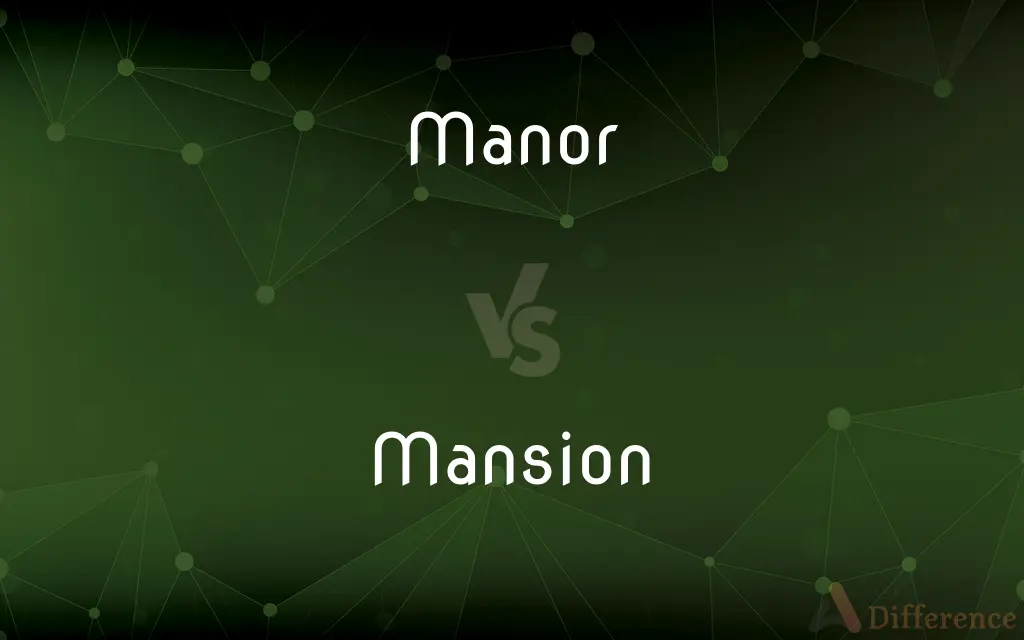Manor vs. Mansion — What's the Difference?
By Tayyaba Rehman — Updated on September 3, 2023
A manor is a landed estate or historic home, often with legal rights, while a mansion is a large, opulent residence.

Difference Between Manor and Mansion
Table of Contents
ADVERTISEMENT
Key Differences
Manors and mansions are both terms that relate to residences, but they have distinct characteristics and historical connotations. A manor typically refers to a historic house or landed estate, possibly with associated buildings and farmland. In contrast, a mansion is a large, often luxurious residence, which does not necessarily have any associated rights or lands.
Historically, a manor had a specific legal definition in England, often being an estate in land to which is incident the right to hold a court termed court baron. Mansions, on the other hand, have no such legal affiliations. Their primary definition lies in their grandeur and size.
In cultural terms, manors are often seen as centers of agricultural and local community life, possibly with serfs or tenants working the land for the lord of the manor. Mansions, meanwhile, are symbols of wealth and status, emphasizing luxury more than functionality or legal rights.
The usage of "manor" can also refer to the main house on a large estate, irrespective of whether it holds any feudal rights. A mansion, however, strictly denotes a sizable and opulent residence, without any indication of agricultural or feudal associations.
Comparison Chart
Definition
A historic house or landed estate
A large, opulent residence
ADVERTISEMENT
Legal Affiliation
Often associated with feudal rights
None
Historical Connotation
Center of agricultural/community life
Symbol of wealth/status
Associated Land
May have associated farmland or buildings
Not necessarily
Cultural Perception
Functional, historic
Luxurious, grand
Compare with Definitions
Manor
A landed estate with associated rights.
The lord presided over his manor with authority.
Mansion
A sizable and luxurious dwelling.
They hosted extravagant parties at their mansion every summer.
Manor
The main residence on a large estate.
They approached the grand entrance of the manor.
Mansion
A historic or architecturally significant large house.
The city preserved the 19th-century mansion as a heritage site.
Manor
A jurisdiction or territory of a manorial lord.
The manor's boundaries extended beyond the river.
Mansion
A residence signifying wealth or high social status.
The mansion's gold-plated gates reflected its owner's affluence.
Manor
A historic house, often of significance in its locality.
The village's history revolved around the ancient manor.
Mansion
An opulent residence often with multiple rooms and amenities.
The mansion boasted a home theater, indoor pool, and a library.
Manor
A large country house with its lands.
The manor's gardens were renowned in the county.
Mansion
A mansion is a large dwelling house. The word itself derives through Old French from the Latin word mansio "dwelling", an abstract noun derived from the verb manere "to dwell".
Manor
A large country house with lands
A Tudor manor house in the English countryside
Kelmscott Manor
Mansion
A large, impressive house.
Manor
The district covered by a police station
They were the undisputed rulers of their manor
Mansion
A large stately house.
Manor
A landed estate.
Mansion
A manor house.
Manor
The main house on an estate; a mansion.
Mansion
A dwelling; an abode.
Manor
A tract of land in certain North American colonies with hereditary rights granted to the proprietor by royal charter.
Mansion
A separate dwelling in a large house or structure.
Manor
The district over which a lord had domain and could exercise certain rights and privileges in medieval western Europe.
Mansion
See house.
Manor
The lord's residence in such a district.
Mansion
Any one of the 28 divisions of the moon's monthly path.
Manor
A landed estate.
Mansion
A large house or building, usually built for the wealthy.
Manor
The main house of such an estate or a similar residence; a mansion.
Mansion
(UK) A luxurious flat (apartment).
Manor
A district over which a feudal lord could exercise certain rights and privileges in medieval western Europe.
Mansion
An apartment building.
Manor
The lord's residence and seat of control in such a district.
Mansion
(obsolete) A house provided for a clergyman; a manse.
Manor
Any home area or territory in which authority is exercised, often in a police or criminal context.
Mansion
(obsolete) A stopping-place during a journey; a stage.
Manor
One's neighbourhood.
Mansion
(historical) An astrological house; a station of the moon.
Manor
The land belonging to a lord or nobleman, or so much land as a lord or great personage kept in his own hands, for the use and subsistence of his family.
My manors, rents, revenues, l forego.
Mansion
(Chinese astronomy) One of twenty-eight sections of the sky.
Manor
A tract of land occupied by tenants who pay a free-farm rent to the proprietor, sometimes in kind, and sometimes by performing certain stipulated services.
Mansion
An individual habitation or apartment within a large house or group of buildings. (Now chiefly in allusion to John 14:2.)
Manor
The mansion of the lord of the manor
Mansion
Any of the branches of the Rastafari movement.
Manor
The landed estate of a lord (including the house on it)
Mansion
A dwelling place, - whether a part or whole of a house or other shelter.
In my Father's house are many mansions.
These poets near our princes sleep,And in one grave their mansions keep.
Mansion
The house of the lord of a manor; a manor house; hence: Any house of considerable size or pretension.
Mansion
A twelfth part of the heavens; a house. See 1st House, 8.
Mansion
The place in the heavens occupied each day by the moon in its monthly revolution.
The eight and twenty mansionsThat longen to the moon.
Mansion
To dwell; to reside.
Mansion
(astrology) one of 12 equal areas into which the zodiac is divided
Mansion
A large and imposing house
Common Curiosities
Can a modern house be termed a mansion?
Yes, if it's large and luxurious, it can be termed a mansion.
What does a manor typically represent?
A manor is typically a historic house or landed estate, often with associated rights or lands.
Do manors have a legal significance?
Historically, especially in England, many manors had legal rights, like the right to hold a local court.
Why might someone refer to their home as a manor?
They might do so due to its historic significance, size, or the presence of associated lands or rights.
Is a mansion always larger than a manor?
Not necessarily; while a mansion denotes a large, opulent residence, a manor's emphasis is on historical and possibly legal significance.
Does every manor come with land?
Often, but not always. A manor can refer to the main house on an estate without specifying the size of its associated lands.
Are manors common in the US?
While the US has historic homes and large estate houses, the feudal concept of a "manor" is more European in origin.
Which term has feudal associations?
The term "manor" often has feudal associations, especially historically.
How old is the concept of a mansion?
The concept of large, luxurious residences (mansions) exists across cultures and has ancient origins.
Are mansions always luxurious?
Typically, yes. Mansions are known for their grandeur and opulence.
Can a mansion be a manor?
If a large and luxurious house (mansion) is also a historic landed estate with specific rights, it could be considered both.
How does one differentiate between a large house and a mansion?
A mansion typically denotes a level of opulence and grandeur beyond just size.
Do people still build mansions today?
Yes, many wealthy individuals build large, luxurious homes today, which can be termed mansions.
Are all manors old or historic?
While many manors have historical significance, not every large estate house is necessarily "historic" in age.
Is the word "mansion" used only in American English?
No, the term "mansion" is used in various forms of English, denoting a large, opulent residence.
Share Your Discovery

Previous Comparison
Oblong vs. Oval
Next Comparison
Platitude vs. BanalAuthor Spotlight
Written by
Tayyaba RehmanTayyaba Rehman is a distinguished writer, currently serving as a primary contributor to askdifference.com. As a researcher in semantics and etymology, Tayyaba's passion for the complexity of languages and their distinctions has found a perfect home on the platform. Tayyaba delves into the intricacies of language, distinguishing between commonly confused words and phrases, thereby providing clarity for readers worldwide.













































